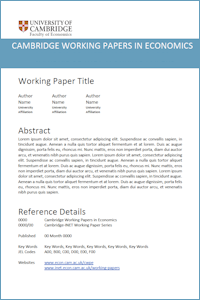
Friedman, D. and Fan, J. and Gair, J. and Iyer, S. Redlicki, B and Velu, C.
How Fundamentalism Takes Root: A Simulation Study
CWPE1681
Abstract: We report agent-based simulations of religiosity dynamics in a spatially dispersed population. Agents' religiosity responds to neighbours via pairwise interactions as well as via club goods effects. A simulation run is deemed fundamentalist if the final distribution contains a sizable minority of very high religiosity together with a majority of lesser religiosity. Such simulations are more prevalent when parameter values shift from values reflecting traditional societies towards values reflecting the modern world. The simulations suggest that the rise of fundamentalism in the modern world is boosted by greater real income, lower relative prices for secular goods, less substitutability between religious and secular goods, and less time spent with neighbours. Surprisingly, the simulations suggest little role for the rise of long distance communication and transportation.
Keywords: fundamentalism, club goods, agent-based models
JEL Codes: Z12 D79 D85 H49
Author links: Sriya Iyer
PDF: https://www.econ.cam.ac.uk/research-files/repec/cam/pdf/cwpe1681.pdf 
Open Access Link: https://doi.org/10.17863/CAM.7840
